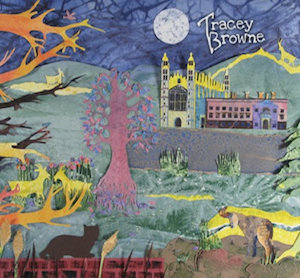 Tracey Browne – The Doctrine of Song
Tracey Browne – The Doctrine of Song
Self Released – 25 May 2018
A recording engineer, multi-instrumentalist and session musician who’s been a regular contributor to Thea Gilmore’s studio and live work (and to whom she often bears a striking vocal and melodic resemblance), Tracey Browne’s also an artist in her own right, having already released a couple of solo albums, a clutch of live recordings and EPs as well as a duo album with Raevennan Husbandes. Produced by Nigel Stonier (who co-penned several tracks) and featuring Gilmore on backing vocals with C.J. Hillman providing electric guitar, it opens with the syncopated rhythm and relentless march beat of Compliance, an Eastern European flavour percolating a song that addresses rule through fear and division.
A similarly powerful but melodic approach underpins Hit The Road Running, a song of positivity and self-assertion to which Liz Hanks’ cello adds deep colours. Despite the title, bearing a clear Gilmore influence Mucho Gusto is a slow-paced ballad about a drummer, a ‘music behemoth’ from Farnworth, and his inexplicable slide into suicidal depression. Again drawing Gilmore comparisons, Preachy Keen is an infectiously bouncy pop number about some “life coach meets drama queen” touring their stuck on repeat one-man show imparting their wisdom and sporting the inspired line about being a “Rebel without a good thesaurus.”
Another moodily cello-enhanced atmospheric ballad, with its wordless chant-like chorus the slow sway folk-styled acoustic My Father’s Love lyrically speaks for itself as indeed does the 90-second nervy acoustic strum It’s Nice To Be Nice, though perhaps the lines ‘Cariad bach, sweet fart/Owtch, bumhead, you’re the bestest/Iggle diggle and all the restest” are not her greatest lyrical moment.
The album takes an upbeat FM rock flavour, for As Far As the Heart Can See with its shades of Sheryl Crow, but otherwise the remaining numbers keep things reined back, Never You complementing its simple fingerpicked guitar backing with occasional handclaps and wordless choral backing, while, after a scratchy start, Chapel Lane settles back into a childhood reflections tinkling piano, pulsing cello, rhythmically ebb and flow ballad mode in memory of a friend’s mother, and was actually written on the mother’s piano.
It ends with another piano and cello-based track, The Lauded Gun, essentially a chorale protest song call to resist those heartless figures of power and authority who would keep you down and crush your heart, the final verse referencing the refusal to allow refugee children into the country, NHS doctors striking over safety and pay and a reminder of how it took 27 years for those responsible for the Hillsborough tragedy to be brought to justice and made accountable for their actions.
Powerfully sung in clear, distinctive tones, it’s at moments like this that Browne soars above the comparisons and influences with a voice that’s very much her own. If you’ve not been aware of her before, perhaps seek it out because you like the ideas of the Gilmore associations, but Browne sings from her own canon.
Order The Doctrine of Song via Bandcamp https://traceybrowne.bandcamp.com/album/the-doctrine-of-song
http://www.traceybrowne.co.uk/
